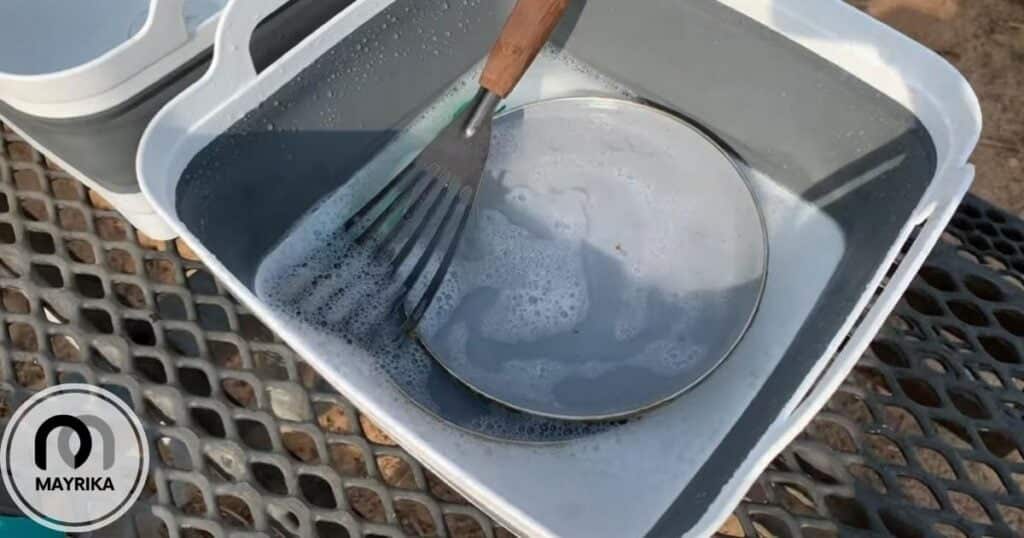In this blog, you will learn about how to make the most of your camping trip by cleaning your cookware at camp.
This is a guide on how to make it easy to clean your cookware while camping, with the help of your hands and a campfire.
What you will need for cleaning cookware while camping
There are a few things you will need to clean cookware while camping. These include a pot scrubber, a dishcloth, and a bucket.
The pot scrubber is used to remove any food or grease from the pot, while the dishcloth is used to clean the inside and outside of the pot.
The bucket is used to rinse everything off.
How to clean cookware while camping
One of the most important things you can do when camping is to keep your cookware clean and free of bacteria.
There are a few easy ways to do this:
1. Clean cookware with boiling water – Boil some water in a pot or pan, and use it to clean your cookware.
This method is effective at removing grease and food residue from your cookware, making it clean and bacteria-free.
2. Use a scrubber sponge – If boiling water isn’t an option or you don’t have a campsite dishwashing station available, use a scrubber sponge to clean your cookware.
This method is gentle on your cookware and can be used on both metal and non-metal cookware.
Simply wet the sponge, add some soap or detergent, and scrub until the surface is clean.
3. Use a degreaser – If you have access to one, use a degreaser to clean your cookware.
This will remove any built-up grease and grime, making it easier to clean and preventing any rust from forming.
4. Keep your cookware dry – Moisture is the enemy of cookware – keep it dry by storing it in a cool, dry place when not in use.
This will help to keep it corrosion-free and extend its lifespan.
Hopefully, these tips will help make cleaning your cookware while camping a breeze – just make sure to have the right tools on hand!
Cleaning cookware with soap and baking soda
Cleaning cookware with soap and baking soda is a great way to keep your campsite clean and smelling fresh.
Follow these simple steps to get the job done:
- Soak your cookware in a large pot of hot water overnight.
- The next day, scrub the cookware with a detergent and a brush, then rinse it off.
- For tough spots, mix 1 cup of baking soda with 2 cups of water and pour it into the pot. Scrub the surface of the cookware with this solution until it is clean.
- Rinse off the cookware with cold water and let it dry completely before using it again.
Cleaning cookware with water while camping
Camping is a great way to get away from the hustle and bustle of city life and connect with nature. However, it can be difficult to clean cookware while camping.
If you’re planning on camping and cooking over an open fire, it’s important to know how to clean your cookware with water.
Here are 5 simple steps:
- Wet your hands thoroughly before cleaning. This will help avoid staining your clothing or skin.
- Soak the cookware for a few minutes in water mixed with soap. Be sure to scrub the surface of the pan or pot well.
- Rinse off the cookware with fresh water and dry it off. Make sure all surfaces are completely clean before storing them away.
- If any food remains on the cookware, use a paper towel to absorb any excess liquid and then wipe clean.
- Repeat steps 2-4 as necessary until all surfaces are clean.
Cleaning cookware by using vinegar and soap
Camping is a great way to get outdoors and experience new things. One of the best things about camping is the opportunity to cook your meals.
Cooking your food in an outdoor setting can be fun, but it can also be messy. If you want to clean your cookware while camping, you can use vinegar and soap.
Vinegar is a natural cleaner that can remove dirt, grease, and food residue from cookware. Soap adds lather and helps dissolve contaminants.
Combine these two ingredients in a pot or pan, and scrub the surface with circular motions.
Be sure to rinse off the utensil thoroughly after cleaning it with vinegar and soap.
This method is effective for cleaning most types of cookware including stainless steel, aluminum, copper, and cast iron.

Tips on how to make camping cooking easier
If you’re new to camping, cooking can be a bit of a hassle.
Here are some tips on how to make cooking easier during camping:
1. Make a list of what you’ll need – Before you go camping, make a list of all the food and ingredients you’ll need.
This will help you avoid running out of anything and save time in the kitchen.
2. Keep your cooking gear organized – This is especially important if you’re using a stove or oven.
Having everything laid out and labeled will make the process much easier.
3. Make sure your cooking gear is in good condition – This includes your pots and pans, knives, and other kitchen utensils.
If they’re scratched or rusty, they’ll ruin your food before you even get a chance to cook it.
4. Preheat your oven or stove before you go – This will help to save energy and keep your campsite clean.
5. Pack your food in airtight containers – Camping is all about enjoying the outdoors, but it’s also about keeping things clean.
Pack your food in airtight containers to avoid spoilage and ensure that it tastes good when you finally get to eat it!
6. Get creative with your cooking – Cooking can be fun when you use some creative recipes that turn out well even in difficult conditions.
Try something new every time you cook so that everything turns out delicious!
7. Don’t forget the firewood – Having a good fire going is essential for cooking delicious meals outdoors.
Make sure to bring enough wood with you to last the duration of your trip.
Hopefully, these tips will help make camping cooking easier for you in the future!
How to choose cookware for camping
Camping is a great way to get outside and experience the natural world. However, cooking can be a pain in the neck if you don’t have the right cookware.
Here are some tips on how to choose cookware for camping:
1. Choose cookware that is durable: Camping can be hard on cookware, so make sure to choose something that will stand up to abuse.
Check out reviews online to see what other campers have had success with.
2. Choose cookware that is easy to clean: You don’t want to spend half your time cleaning your cookware while you’re out camping!
Look for pots and pans that are dishwasher safe and have tight-fitting lids that don’t require a lot of force to close them.
3. Consider size and weight: Consider size and weight when choosing cookware for camping.
4. An outdoor chef set: These sets come with everything from a portable stovetop to a dutch oven.
They’re perfect for cooking larger meals or dishes that require slow simmering or baking while you’re outdoors.
FAQs
What do you do with dirty dish water when camping?
When it comes to cleaning up after a camping meal, many people opt for pouring dirty dish water onto the ground, only to be faced with the unpleasant task of retrieving and disposing of the soiled water.
But what if there was an easier way? One option is to use a container specifically designed for this purpose- like a dishpan or pot.
When filling these containers with dirty dish water, make sure to pack in enough sand or grit so that the liquid doesn’t seep through.
And finally, when it’s time to clean up, simply dump the contents of the container into the trash and carry on with your day!
How do you wash dishes without water when camping?
One cannot simply wash dishes without water when camping, as this would be incredibly unsanitary and could lead to a number of health problems.
One must instead take measures to ensure that all dishes are clean before using them and after each meal.
This can be done by wiping them down with a clean cloth or paper towel and then using a biodegradable soap to scrub the dishes clean.
Can you use baby wipes to clean dishes?
The short answer is no, you cannot use baby wipes to clean dishes.
Baby wipes are not designed to clean dishes and they will not do a good job of it.
The material they are made from is not abrasive enough to remove food and other particles from dishes, and they will not kill bacteria or other organisms that can cause illness.
In addition, baby wipes are not typically made of absorbent materials, so they will not soak up water or other liquids well.
How do you wash dishes for winter camping?
In order to wash dishes for winter camping, you will need to gather some supplies.
You will need a large pot or basin, water, soap, and a scrub brush.
If you have access to a sink, you can fill the pot or basin with water and soap and scrub the dishes clean.
If you do not have access to a sink, you can heat up water on a camp stove and use that to wash the dishes.
Be sure to rinse the dishes well after washing them.
Can I use Lysol wipes to clean dishes?
No, you cannot use Lysol wipes to clean dishes. The chemicals in Lysol wipes are not meant to be ingested and can be harmful if consumed.
Additionally, the wipes are not as effective as other cleaning products in removing food and bacteria from dishes.
How do you dry dishes while camping?
There are a few different ways to dry dishes while camping. One way is to use a dish rack.
You can place the dish rack on top of a table or counter, or even on the ground.
Another way is to use a towel. Simply set the towel on the ground or on a table, and then place the dishes on top of it.
You can simply set them out in the sun to dry.
Conclusion
Cooking on the campfire is a great way to gather around a fire and share stories while enjoying delicious food.
However, cooking in outdoor cookware can be difficult and dirty.
To make your camping experience even more enjoyable, follow the tips discussed earlier in this blog post for cleaning your cookware while camping.
